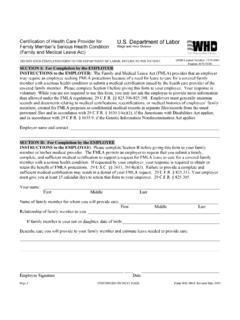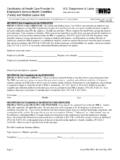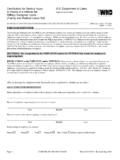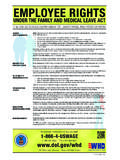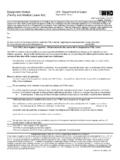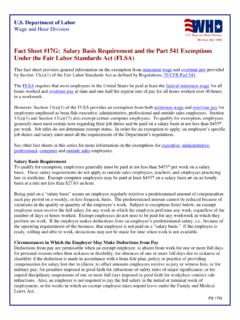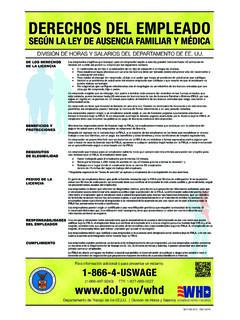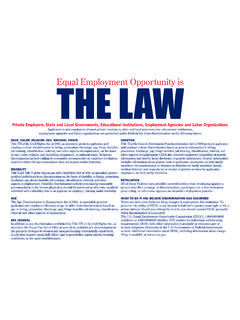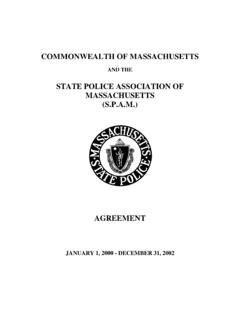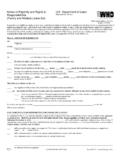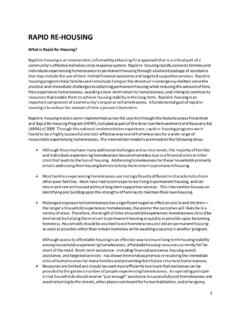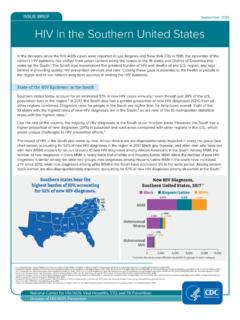Transcription of FAQs about Affordable Care Act Implementation Part 51, …
1 1 FAQS about Affordable care ACT Implementation PART 51, FAMILIES FIRST CORONAVIRUS RESPONSE ACT AND CORONAVIRUS AID, RELIEF, AND ECONOMIC SECURITY ACT Implementation January 10, 2022 Set out below are Frequently Asked Questions (FAQs) regarding Implementation of the Families First Coronavirus Response Act (FFCRA), the Coronavirus Aid, Relief, and Economic Security Act (CARES Act), and the Affordable care Act. These FAQs have been prepared jointly by the Departments of Labor, Health and Human Services (HHS), and the Treasury (collectively, the Departments). Like previously issued FAQs (available at and #Affordable_Care_Act), these FAQs answer questions from stakeholders to help people understand the law and benefit from it, as intended.
2 COVID-19 DIAGNOSTIC TESTING The FFCRA was enacted on March 18, Section 6001 of the FFCRA generally requires group health plans and health insurance issuers offering group or individual health insurance coverage, including grandfathered health plans, to provide benefits for certain items and services related to testing for the detection of SARS-CoV-2 (the virus that causes coronavirus disease 2019 (COVID-19)) or the diagnosis of COVID-19, when those items or services are furnished on or after March 18, 2020, and during the applicable emergency Under the FFCRA, plans 1 Pub.
3 L. No. 116-127 (2020). 2 On January 31, 2020, HHS Secretary Alex M. Azar II declared that as of January 27, 2020, a public health emergency exists nationwide as the result of the 2019 novel coronavirus. See HHS Office of the Assistant Secretary for Preparedness and Response, Determination of the HHS Secretary that a Public Health Emergency Exists, available at On October 15, 2021, the HHS Secretary renewed the COVID-19 public health emergency declaration, effective October 18, 2021, that was previously renewed on April 21, 2020, July 23, 2020, October 2, 2020, January 7, 2021, April 15, 2021, and July 19, 2021.
4 See HHS Office of the Assistant Secretary for Preparedness and Response, Renewal of Determination That A Public Health Emergency Exists, available at The HHS Secretary may extend the public health emergency declaration for subsequent 90-day periods for as long as the public health emergency continues to exist, and may terminate the declaration whenever he determines that the public health emergency has ceased to exist. On January 22, 2021, Acting HHS Secretary Norris Cochran sent a letter to governors announcing that HHS has determined that the public health emergency will likely remain in place for the entirety of 2021, and when a decision is made to terminate the declaration or let it expire, HHS will provide states with 60 days notice prior to termination.
5 2 and issuers must provide this coverage without imposing any cost-sharing requirements (including deductibles, copayments, and coinsurance), prior authorization, or other medical management requirements. The CARES Act was enacted on March 27, Section 3201 of the CARES Act amended section 6001 of the FFCRA to include a broader range of diagnostic items and services that plans and issuers must cover without any cost-sharing requirements, prior authorization, or other medical management Section 3202(a) of the CARES Act requires plans and issuers providing coverage to reimburse a provider that has a negotiated rate with the plan or issuer for COVID-19 diagnostic testing an amount that equals that negotiated rate.
6 Or, if the plan or issuer does not have a negotiated rate with such provider, the cash price for such service that is listed by the provider on a public website. (The plan or issuer may negotiate a rate with the provider that is lower than the cash price.) Additionally, during the public health emergency related to COVID-19 declared under section 319 of the Public Health Service Act (PHS Act), section 3202(b) of the CARES Act and implementing regulations at 45 CFR Part 182 require providers of diagnostic tests for COVID-19 to make public the cash price of a COVID-19 diagnostic test on the provider s public internet website or face potential enforcement action including civil monetary penalties.
7 Under section 6001(c) of the FFCRA, the Departments are authorized to implement the requirements of section 6001 of the FFCRA through sub-regulatory guidance, program instruction, or otherwise. The Departments have previously issued four sets of FAQs to implement provisions of the FFCRA and CARES Act and to address other health coverage issues related to Due to the urgent need to continue to facilitate the nation s response to the public health emergency posed by COVID-19, the Departments believe that this guidance is a statement of policy not subject to the notice and comment requirements of the Administrative Procedure Act (APA).
8 6 For the same reasons, the Departments additionally find that, even if this guidance were subject to the public participation provisions of the APA, prior notice and 3 Pub. L. No. 116-136 (2020). 4 For purposes of this document, references to section 6001 of the FFCRA include the amendments made by section 3201 of the CARES Act, unless otherwise specified. 5 See FAQs about Families First Coronavirus Response Act and Coronavirus Aid, Relief, and Economic Security Act Implementation Part 42 (Apr. 11, 2020), available at and (FAQs Part 42); FAQs about Families First Coronavirus Response Act and Coronavirus Aid, Relief, and Economic Security Act Implementation Part 43 (June 23, 2020), available at and (FAQs Part 43); FAQs about Families First Coronavirus Response Act and Coronavirus Aid, Relief, and Economic Security Act Implementation Part 44 (Feb.)
9 26, 2021), available at and (FAQs Part 44); and FAQs about Affordable care Act Implementation Part 50, Health Insurance Portability and Accountability Act and Coronavirus Aid, Relief, and Economic Security Act Implementation (Oct. 4, 2021), available at and (FAQs Part 50). 6 5 553(b)(A). 3 comment for this guidance is impracticable and/or contrary to the public interest, and there is good cause to issue this guidance without prior public comment and without a delayed effective In June 2020, the Departments issued FAQs Part 43. In FAQs Part 43, Q4, the Departments stated that plans and issuers are required under section 6001 of the FFCRA to cover COVID-19 tests intended for at-home testing, when the test is ordered by an attending health care provider who has determined that the test is medically appropriate for the individual based on current accepted standards of medical practice and the test otherwise meets the statutory criteria under the In issuing FAQs Part 43, the Departments noted that, as of the date of publication of that document, the Food and Drug Administration (FDA)
10 Had not yet authorized any COVID-19 diagnostic tests to be completely used and processed at However, since June 2020, when FAQs Part 43 were issued, the FDA has authorized additional diagnostic tests for COVID-19, including tests that can be self-administered and self-read at home or elsewhere without the involvement of a health care provider, sometimes referred to as self-tests or at-home These at-home diagnostic tests are now available either by prescription or over-the-counter (OTC) (without either a prescription or individualized clinical assessment by a health care provider), through pharmacies, retail stores, and online retailers.
